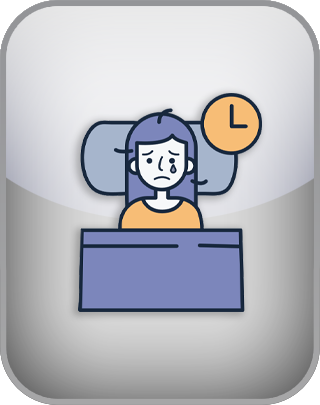Pre-sleep Thought Inventory Test (GCTI)
The Glasgow Content of Thoughts Inventory (GCTI) is a questionnaire developed by Karen J. Harvey and Colin A. Espie at the University of Glasgow to assess pre-sleep cognitive activity in adults with sleep-onset insomnia. Published in the British Journal of Clinical Psychology (2004), it demonstrates strong psychometric properties. The GCTI measures the frequency of intrusive thoughts, such as worries or racing thoughts, that hinder sleep. It is used in clinical and research settings to evaluate cognitive contributors to insomnia and inform treatment.
Question 1 of 25
Instructions: The following are thoughts that people may have when they can’t sleep. Please indicate how often over the past 7 nights each thought has kept you awake:
Thinking about checking the time.
| Disagree | Agree |
NEXT
The Glasgow Content of Thoughts Inventory (GCTI) is a psychometric tool designed to assess cognitive processes disrupting sleep, particularly in sleep-onset insomnia. Developed by Karen J. Harvey and Colin A. Espie at the University of Glasgow, this 25-item self-report questionnaire was published in the British Journal of Clinical Psychology in 2004. It measures the frequency of intrusive pre-sleep thoughts that hinder falling asleep, providing insight into mental barriers fueling insomnia. The GCTI’s items were derived from real-time audio recordings of insomniacs’ thoughts, ensuring authenticity in capturing cognitive experiences relevant to sleep difficulties.
The GCTI’s academic credentials are robust, with strong psychometric properties validating its use. The original study reported a Cronbach’s alpha of .870 for internal consistency and a test-retest reliability of .878 (intraclass correlation coefficient). Validated with 29 insomniacs and 29 good sleepers, it distinguishes groups with a cutoff score of 42, offering 100% sensitivity and 83% specificity. These metrics establish the GCTI as a reliable instrument for identifying cognitive patterns linked to insomnia, particularly those tied to cognitive arousal, a key driver of sleep disturbance.
In practice, the GCTI helps clinicians and researchers identify thoughts disrupting sleep, such as worries about the future, daily reflections, or sleep-related concerns. Its 25 items are grouped into three facets: active problem-solving, present state monitoring, and environmental reactivity, covering planning, bodily sensations, and external distractions. Respondents rate thought frequency over the past seven nights on a likely 4-point Likert scale (e.g., Never to Often). Total scores range from 25 to 100, with higher scores indicating greater cognitive intrusion, guiding targeted interventions.
Clinically, the GCTI informs cognitive behavioral therapy for insomnia (CBT-I) by pinpointing specific thought patterns to address, enhancing treatment outcomes. In research, it supports studies on insomnia’s cognitive mechanisms, contributing to theoretical models and new therapies. Its items, grounded in prior work by Wicklow and Espie (2000) and real-world data, ensure relevance to insomniacs’ experiences, making it a practical tool for understanding the cognition-sleep interplay in both clinical and academic contexts.
Rooted in the University of Glasgow’s Department of Psychological Medicine and published in a peer-reviewed journal, the GCTI holds strong academic credibility. Its ability to quantify intrusive pre-sleep thoughts makes it a cornerstone in sleep research, offering critical insights into insomnia’s cognitive underpinnings and supporting evidence-based practices in sleep medicine.
References
- Harvey, K. J., & Espie, C. A. (2004). Development and preliminary validation of the Glasgow Content of Thoughts Inventory (GCTI): A new measure for the assessment of pre-sleep cognitive activity. British Journal of Clinical Psychology, 43(4), 409–420.
- Watts, F. N., Coyle, K., & East, M. P. (1994). The contribution of worry to insomnia. British Journal of Clinical Psychology, 33(2), 211–220.
- Wicklow, A., & Espie, C. A. (2000). Intrusive thoughts and their relationship to actigraphic measurement of sleep: Towards a cognitive model of insomnia. Behaviour Research and Therapy, 38(7), 679–693.

